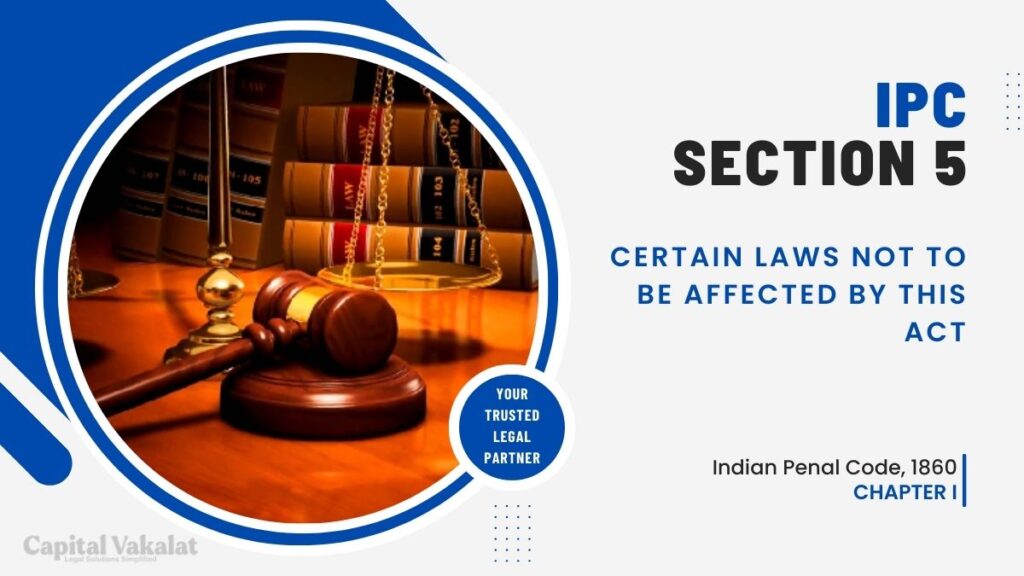In the realm of legal jurisprudence, the Indian Penal Code (IPC) stands as a cornerstone, governing a multitude of criminal offenses in India. Among its provisions, Section 5 holds a significant place. This article delves into the intricacies of Section 5 IPC, highlighting its implications and exceptions in light of certain laws that remain unaffected by its provisions.

The Indian Penal Code, formulated in 1860, encompasses a comprehensive array of criminal offenses and their respective penalties. Within its provisions lies Section 5, which plays a pivotal role in delineating exceptions to certain legal principles established by the IPC.
Understanding Section 5 IPC
Section 5 IPC sets forth a fundamental principle that certain laws remain untouched by the IPC. It specifies that nothing contained in the IPC shall affect the provisions of any special or local law, other than that which is herein provided. In essence, this section carves out a space for coexistence between general criminal laws and specific legislations, ensuring a harmonious legal framework.
The Scope of Section 5
The scope of Section 5 IPC is expansive, encompassing a plethora of situations and contexts where the provisions of the IPC are overridden by other enactments. This encompasses a diverse range of matters, including military offenses, marital disputes, and religious practices.
Exceptions to the General Rule
Right of Private Defense
One of the notable exceptions to the general rule under Section 5 is the right of private defense. Individuals are entitled to protect themselves and others from imminent harm, even if it means using force. This right prevails over the IPC when the conditions for its exercise are met.
Military and Naval Offenses
Section 5 recognizes that military and naval personnel may be governed by their own specific laws, separate from the IPC. This acknowledges the unique circumstances under which these individuals operate and the necessity of tailored legal regulations.
Marriage and Religion
Certain laws related to marriage and religion remain untouched by the IPC’s provisions. Customary practices, rituals, and rites embedded in personal laws often supersede the general criminal laws outlined by the IPC.
Interplay with Other Legal Provisions
Section 5’s interplay with other legal provisions is a matter of nuanced consideration. It often necessitates a delicate balance between upholding individual rights and maintaining societal order. This dynamic interaction is exemplified in numerous legal cases that have reached the courts.
Analyzing Landmark Cases
State v. Rajan
In the case of State v. Rajan, the court grappled with the question of whether Section 5 could be invoked to override a state-specific law governing environmental protection. The court’s verdict underscored the importance of harmonizing laws while prioritizing the greater public good.
Mohan v. Union of India
Mohan v. Union of India provided an opportunity for the judiciary to examine the compatibility of Section 5 with constitutional rights. The court’s decision highlighted the need for meticulous scrutiny of legal provisions that claim exemption from the IPC’s ambit.
Critique and Controversies
Human Rights Concerns
While Section 5 seeks to strike a balance between different legal regimes, it has faced criticism on the grounds of potential human rights violations. Critics argue that certain special laws could infringe upon individual rights, necessitating a reevaluation of the scope of Section 5.
Constitutional Validity
The constitutionality of Section 5 has been a subject of debate. Some legal scholars argue that the section may grant excessive power to specific laws, potentially undermining the principles enshrined in the Constitution.
Evolving Jurisprudence
As society evolves, so does legal thought. The interpretation and application of Section 5 continue to evolve with changing times. Courts must carefully consider the delicate equilibrium between preserving legal diversity and ensuring fundamental rights.
Future Prospects
The future of Section 5 IPC lies in its adaptability to unforeseen legal scenarios. It must accommodate emerging legal challenges while safeguarding individual liberties and societal harmony.
Conclusion
Section 5 IPC stands as a testament to the complexity of legal pluralism in India. It navigates the intricate web of laws governing diverse aspects of life while ensuring that the IPC coexists harmoniously with specialized legislations. As the legal landscape continues to transform, Section 5 remains a crucial linchpin in maintaining equilibrium within the realm of criminal law.
Here are some external resources that provide further details on IPC Section 5 and related legal topics:
- Indiankanoon – Section 5 IPC Explained: An in-depth analysis of IPC Section 5 and its implications on Indiankanoon’s website.
- LawRato – Exceptions to IPC Section 5: LawRato’s article discusses the exceptions to IPC Section 5, providing case studies and insights.
- The Better India – Balancing Individual Rights and Special Laws: This article explores the fine line between individual rights and special laws, including IPC Section 5.
- LegalServiceIndia – Impact of IPC Section 5: A comprehensive guide on the impact and practical implications of IPC Section 5 on various legal scenarios.
These resources provide a deeper understanding of IPC Section 5 and its significance within the legal framework.
FAQs
How does Section 5 affect the right of private defense?
Section 5 does not impede the right of private defense; individuals can still invoke this right under specific circumstances.
Are there any limitations on invoking Section 5 for military personnel?
Military personnel may have their own governing laws for certain offenses, separate from the IPC, under the purview of Section 5.
Can religious practices be exempted under Section 5?
Yes, certain religious practices and rituals could be exempted from the IPC’s provisions under Section 5.
What is the significance of Section 5 IPC in contemporary legal discourse?
In contemporary legal discussions, Section 5 IPC prompts debates on legal pluralism, harmonization of laws, and the balance between individual rights and societal needs.